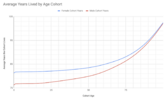If you would have asked me several years ago, I would have said that 59 1/2 was the age you had to be above to avoid the age related 10% penalty for Roth and 401k accounts (or other tax deferred accounts).
If you would have asked me several months ago, I would say 55 was the age you had to be above to conditionally avoid the age related 10% penalty due to the Rule of 55. It requires a certain scenario, it doesn't apply to Roth accounts or even all 401k accounts, it only applies to a 401k account with an employer you worked for after you turned 55 and then left.
If you would ask me today what the age you would have to be above to avoid that penalty conditionally I would say something like 23. With a huge disclaimer that it requires a very specific combination of accounts and steps. It doesn't apply to Roth accounts on their own or 401k accounts on their own. It requires having funds in a 401k (or some other tax deferred retirement account), converting those funds into a Roth, and waiting 5 years after that specific conversion.
So what's the minimum age someone could get a 401k? It has to be offered if you are 21 or over. But they could offer one to an 18 year old even if they aren't required to do so.
"Companies that offer 401k plans are obligated by the IRS to offer you their plans if you're at least 21 years of age, have worked at least a year at the company, and provided at least 1,000 hours of service. There is no minimum age requirement for making 401k contributions."
Whats that age + 5? That is the minimum age you could conditionally wash 401k into Roth contributions and unlock it so that it could be withdrawn as a contribution without penalty.
I'm saying a hypothetical 18 year old making a 7 figure income could max his 401k contribution for his first year in the span of a few paychecks and invest it into a hypothetical stock that goes ballistic and a few months later convert funds from the 401k to a Roth, wait 5 years and have access to the gains in his 20s. Yes he'll pay very high taxes along the way for the 401k to roth conversion, but I'm saying it's new to me to conceive that he can avoid the 59 1/2 age related 10% penalty while doing so.
Which comes back to this
View attachment 974393
In the clip below he gives the example of someone who is in their 30s
48 seconds · Clipped by Doug Hanson · Original video "The Roth IRA 5 Year Rules Explained: Navigating Three Confusing 5 Year Roth IRA Rules" by Safeguard Wea...

youtube.com
That is what the quoted sentence "
I mean I knew that contributions (actual money from my checking account into my Roth) could pulled out without penalty. I just didn't know before today that money I've had in a 401k for more than a decade could be washed into being a "contribution" that can come out without penalty in the same way." was about. It's not that it's coming out of the 401k tax free (there would be plenty of taxes involved), it's that I can access it before 59 1/2 without paying an additional 10% penalty, that is the concept I'm highlighting.





